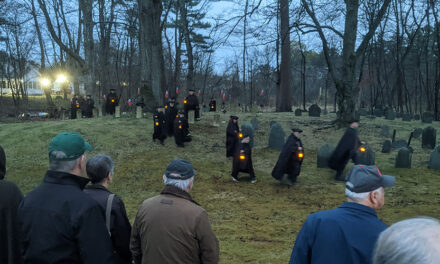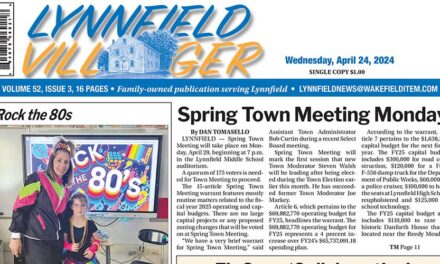By DAN TOMASELLO
LYNNFIELD — While plans for reopening schools in the fall are still being finalized, the School Committee expressed concerns about the state’s proposed regulations during a June 9 meeting.
Department of Elementary and Secondary Education (DESE) Commissioner Jeff Riley recently sent superintendents guidance about students’ return to the classroom so officials can begin purchasing needed supplies in order to reopen buildings.
The proposed regulations, which are still being finalized, will mandate that classes have no more than 10 students. The regulations will require students and staff to wear masks at all times and stipulates that desks be 6-feet apart.
Riley is recommending that districts order enough supplies for the first 12 weeks of school. He said state officials “are committed to providing support to districts in their acquisition of required supplies.” The supplies include disposable masks, gloves and gowns as well as eye protection, face shields, hand sanitizer and some N95 ventilating masks.
School Committee Chairman Jamie Hayman also noted the regulations will require “no movable classes” and “no lunch rooms.”
“There are a lot of restrictions,” said Hayman. “The state has said this will be in place for the first 12 weeks of the school year.”
Superintendent Jane Tremblay said she and other chief educational officers were “taken aback” when the preliminary guidelines were released because she was under the impression they were going to be announced later this month.
“As predicted, it caused a lot of conversations and a little bit of chaos all over the state,” said Tremblay. “I think we need to sit back, be a little bit patient and wait to hear what the actual logistics are and what the actual plan is. I know that is much easier said than done when families have been in their homes with their children for the past four months and are anxiously waiting for the doors to open in September.”
Tremblay said she is “pretty confident the doors are going to open in September.”
“We are going to do everything in our power as a school district to get as many children in those classrooms as we can safely,” said Tremblay.
Hayman said the school system is required to follow DESE’s rules and regulations due to state law.
“We are not able to go against what they are saying for a number of reasons, but that doesn’t mean we can’t try to influence,” said Hayman.
Hayman noted the proposed regulations come with an expensive price tag.
“There are going to be significant costs associated with reopening,” said Hayman. “I have a number of financial concerns about the impact this is going to have on towns. One of the issues is you are going to have to provide your own personal-protective equipment such as masks in addition to all of the capital that will be needed in order to retrofit schools.”
Hayman also expressed concerns “about the social-emotional well-being of students, teachers, educators and families.”
“There is a psychological impact,” said Hayman.
Hayman said he plans on discussing his concerns with House Minority Leader Brad Jones (R-North Reading) and state Sen. Brendan Crighton (D-Lynn).
“This is now the point where school committees have to start expressing our concerns as well as families’ and constituents’ concerns,” said Hayman.
Tremblay noted the North Shore Superintendents Roundtable has discussed reopening schools with DESE officials.
“I’m optimistic that we will be able to figure something out,” said Tremblay. “It may not be the best of what we had before, but we are going to work really, really hard to do right by our students and our families. Our students need to get back. They need to see each other, they need to socialize and they need to have lunch next to their friends even if it is a distanced lunch. We all recognize that.”
School Committeeman Phil McQueen said DESE’s guidance creates a lot of logistical issues for schools.
“There are a lot of feasibility issues by having classes with only 10 students, keeping children 6-feet apart and having them wear a mask all day,” said McQueen.
While McQueen has concerns about the state’s plan, he noted the COVID-19 virus is still causing people to get sick.
“Yes it is inconvenient, but we have to think about the safety and well-being of our student body and our educators,” said McQueen.
School Committee member Stacy Dahlstedt is concerned about the proposed regulations’ effect on students’ mental health.
“We owe it to the community and the students to reach out to the Legislature to see what we can do,” said Dahlstedt. “There are so many questions when you peel the onion back. There is a lot more work to do with this, and I am sure we will do whatever we can to the kids back to class as best we can.”
School Committee Vice Chairman Rich Sjoberg echoed Dahlstedt’s concerns.
“We are not only School Committee members, we are also parents,” said Sjoberg. “You could see that DESE’s thought process was meeting all of the CDC’s guidelines and restrictions to prevent the spread of the virus, but it seemed to be severely lacking any thought regarding these protocols’ effect on children’s mental and physical health. It seemed like they wanted to get something out before the school year ends so we could start planning. Hopefully, through our advocacy, we can work with them and share some of these concerns to change the restrictions that have come out.”
Tremblay noted the state will be releasing more information about the guidelines soon. She noted a task force comprised of public health officials, educators and parents has advised Riley about the proposed regulations.
“There is going to be a lot of work that is going to have to be done over the summer, but I am confident we will get it done,” said Tremblay. “The Administrative Leadership Team will put together a plan that will ensure the safety and security of our students, faculty and staff, which is our number one priority.”
School Committee member Tim Doyle said the preliminary guidelines “is not going to be dictated by what the state decides, it’s going to be dictated by what the virus does.”
“If we continue to trend in a great direction, what we saw might not be in place in August,” said Doyle.





